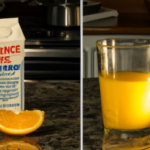Juice Tips and Tricks
How Long Is It For Orange Juice To Go Bad

Did you know that orange juice is considered one of the most popular morning beverages worldwide? In fact, the average American consumes around 2.7 gallons of orange juice each year.
But have you ever wondered how long it takes for orange juice to go bad? As with any perishable food item, the shelf life of orange juice can vary depending on a variety of factors. From the type of orange juice to the storage techniques used, there are many variables that can impact the freshness and safety of this beloved beverage.
In this article, we will explore the different types of orange juice, the factors that affect its shelf life, and how to tell if your orange juice has gone bad. We will also discuss proper storage techniques and ways to extend the shelf life of your orange juice, as well as the potential health risks associated with consuming expired or spoiled orange juice.
So let’s dive in and learn more about the shelf life of orange juice!
Key Takeaways
- Proper storage methods are key in keeping orange juice fresh.
- Signs of spoilage include changes in color, texture, and taste.
- Refrigeration is the most effective method to extend the shelf life of orange juice.
- Always check expiration dates before buying and consuming orange juice.
Types of Orange Juice
You’re gonna love the different types of orange juice available, from freshly squeezed to frozen concentrate! When it comes to orange juice, there are two main types: fresh and concentrated.
Fresh orange juice is made by squeezing oranges. It can be made from organic or non-organic oranges and is available in both pulp and no-pulp varieties. It is often considered the healthier option as it contains more nutrients and is less processed.
Concentrated orange juice is made by removing the water content from oranges and then rehydrating it later. It is often cheaper and has a longer shelf life due to its processing method. It is also available in both organic and non-organic varieties.
Both types have their own unique set of pros and cons. Now, let’s explore the factors that affect orange juice shelf life.
Factors Affecting Orange Juice Shelf Life
Understanding the variables that impact the shelf life of orange juice can help you determine its freshness and quality. Factors affecting orange juice shelf life include packaging and temperature.
Orange juice packaged in glass bottles or tetra packs tend to last longer than those in plastic bottles. Glass and tetra packs have a lower rate of oxygen transmission, which slows down the oxidation process that leads to spoilage. On the other hand, plastic bottles have a higher oxygen transmission rate, which accelerates the oxidation process and shortens the shelf life of orange juice.
Temperature is another critical factor that affects the shelf life of orange juice. Storing orange juice at room temperature (around 20°C) increases the rate of microbial growth, which can cause spoilage. As a result, it’s best to keep orange juice in the refrigerator to slow down the growth of bacteria and fungi.
The optimal temperature range for storing orange juice is between 0°C to 4°C. By understanding these factors, you can ensure that your orange juice stays fresh for longer.
When it comes to fresh squeezed orange juice, the shelf life is even shorter than packaged orange juice. However, there are ways to extend its shelf life.
How Long Does Fresh Squeezed Orange Juice Last?
Freshly squeezed orange juice doesn’t last very long, but there are tricks to prolong its freshness. In fact, the shelf life of fresh squeezed orange juice depends on various factors such as temperature, light exposure, and the presence of air. According to the United States Department of Agriculture (USDA), fresh orange juice can last up to 2-3 days when stored in the refrigerator at 40°F or below. However, there are ways to preserve its freshness for a longer period, such as adding citric acid or ascorbic acid to the juice to prevent oxidation and using an airtight container to store it.
To further illustrate the benefits of fresh squeezed juice, let’s take a look at the table below. This table compares the nutritional value of freshly squeezed orange juice versus pasteurized orange juice, which we will discuss in the next section. As you can see, freshly squeezed orange juice contains higher amounts of vitamin C, folate, and potassium compared to its pasteurized counterpart. Additionally, it is free from added preservatives, which makes it a healthier option.
| Nutrient | Fresh Squeezed Orange Juice | Pasteurized Orange Juice |
|---|---|---|
| Vitamin C | 93.9 mg (156% DV) | 50.0 mg (83% DV) |
| Folate | 74.0 mcg (19% DV) | 45.0 mcg (11% DV) |
| Potassium | 496 mg (10% DV) | 450 mg (10% DV) |
As we have seen, fresh squeezed orange juice is a nutritious and delicious beverage. However, if you’re unable to consume it within a few days, pasteurized orange juice may be a more suitable option. So, how long does pasteurized orange juice last unopened? Let’s find out in the next section.
How Long Does Pasteurized Orange Juice Last Unopened?
If you’re planning on stocking up on store-bought orange juice, it’s important to know its shelf stability and expiration date. Pasteurized orange juice, which has undergone a heat treatment to kill bacteria, can last unopened for several weeks or even months, depending on the brand and storage conditions.
Here are some things to keep in mind:
- Keep the juice in a cool, dry place away from direct sunlight and heat sources.
- Check the expiration date before purchasing and choose the freshest bottle available.
- Look for indicators of spoilage such as off odor, mold, or a cloudy appearance.
- Once opened, the juice should be consumed within a week or two and stored in the refrigerator.
- Remember that the shelf life of orange juice can vary depending on factors such as preservatives and packaging.
Pasteurized orange juice can last unopened for a considerable amount of time, but once opened it should be consumed within a week or two and refrigerated.
In the next section, we’ll explore how long pasteurized orange juice lasts once opened.
How Long Does Pasteurized Orange Juice Last Once Opened?
Once you crack open that bottle of pasteurized orange juice, be sure to finish it within a week or two to savor its deliciousness before it loses its freshness. While pasteurization extends the shelf life of orange juice, it doesn’t make it immune to spoilage. Proper storage methods are key in keeping your juice fresh.
Temperature has a significant impact on the shelf life of orange juice. The ideal temperature for storage is between 32°F to 40°F (0°C to 4°C). At this temperature range, the juice can last up to 7-10 days. However, if the temperature rises above 40°F (4°C), the juice can spoil quickly. It’s also essential to keep the juice in an airtight container and away from direct sunlight. With proper storage methods, you can enjoy your pasteurized orange juice without worrying about spoilage.
As orange juice ages, it may lose its fresh taste and color, and may even develop an off odor or flavor. In the subsequent section, we’ll discuss the signs that orange juice has gone bad.
Signs That Orange Juice Has Gone Bad
You’ll want to keep an eye out for some telltale signs that your orange juice has gone bad. Common contaminants like bacteria and mold can cause the juice to spoil, leading to a change in color, texture, and taste. If you notice any of these changes, it’s best to discard the juice immediately.
One of the easiest ways to tell if your orange juice has gone bad is to check the best before date. Most orange juice manufacturers print a date on the container indicating when the juice is expected to go bad. If the date has passed, it’s likely that the juice has already gone bad.
In addition to checking the best before date, you should also pay attention to any unusual flavors or smells that may be present in the juice. If the juice has a sour or off taste, it’s best to err on the side of caution and throw it away.
Proper storage techniques can help extend the shelf life of your orange juice, which we’ll discuss in the next section.
Proper Storage Techniques
When it comes to proper storage techniques for orange juice, there are two main options: refrigeration and freezing. Personally, I prefer to keep my orange juice in the refrigerator to ensure it stays fresh for as long as possible.
However, if I have a surplus of orange juice that I won’t be able to consume within a few days, I will freeze it for later use.
Refrigeration
If you store your orange juice in the fridge, it’ll last longer than a snowman in summer. Refrigeration is the most effective method to keep your orange juice fresh for a longer period. Here are some key points to keep in mind when refrigerating your orange juice:
-
Store your orange juice at a temperature of 35 to 40°F. This range is ideal for maintaining the quality of the juice and minimizing bacterial growth.
-
Keep the orange juice in its original container or transfer it to an airtight container. This ensures that the juice doesn’t pick up any odors or flavors from other foods in the fridge.
-
Avoid storing the orange juice in the door of the fridge. The temperature in the door fluctuates more than in the main compartment, which can lead to a shorter shelf life.
-
Check the expiration date on the container before you buy the orange juice. Refrigeration can only extend the shelf life of the juice so far, and expired juice can still go bad even if it’s been stored properly.
When it comes to preserving the freshness of orange juice, refrigeration is your best bet. However, if you need to keep your orange juice for an even longer period, freezing is an option to consider.
Freezing
Now that we’ve discussed how refrigeration can prolong the shelf life of orange juice, let’s take a look at another preservation method: freezing. Freezing is another effective way to extend the shelf life of orange juice beyond its expiration date.
There are several freezing techniques and alternatives to choose from, depending on your preference and storage capacity. One way to freeze orange juice is by pouring it into ice cube trays. Once frozen, the cubes can be stored in a freezer bag and used to flavor water or other beverages.
Another method is to pour the juice into a plastic bottle or freezer-safe container, leaving some room for expansion. This method allows for the juice to be thawed and consumed as needed. For those who prefer a more natural approach, freezing freshly squeezed orange juice in a glass jar can also work well.
Regardless of the method chosen, freezing is an excellent way to extend the shelf life of orange juice. Now that we’ve explored the benefits of freezing orange juice, let’s move onto other ways to extend its shelf life.
There are several methods that can be used in conjunction with refrigeration or freezing that can help keep your orange juice fresh for longer.
Ways to Extend Orange Juice Shelf Life
I’ve found that there are a few effective ways to extend the shelf life of orange juice. Firstly, adding preservatives such as citric acid or ascorbic acid can help to inhibit the growth of bacteria and fungi.
Secondly, using a vacuum sealer to remove air from the container can slow down the oxidation process that causes spoilage.
Lastly, storing orange juice in airtight containers can prevent the introduction of oxygen and other contaminants that can accelerate spoilage.
Adding Preservatives
Adding preservatives can help extend the shelf life of orange juice, but some people prefer to drink freshly squeezed juice without any added chemicals. Preservative alternatives such as citric acid and vinegar can be used to maintain the pH level of the juice. These natural preservatives are effective in preventing the growth of bacteria and fungi that cause spoilage.
However, it’s important to note that adding preservatives can have potential health impacts, especially if consumed in large amounts over time. Some preservatives have been linked to allergies, asthma, and even cancer. Therefore, it’s crucial to use preservatives in moderation and follow recommended guidelines.
Using vacuum sealers is another way to extend the shelf life of orange juice without adding preservatives. By removing air from the packaging, vacuum sealers prevent the growth of bacteria and other microorganisms that can spoil the juice. This method also helps maintain the flavor and nutritional value of the juice.
However, it’s important to ensure that the packaging and sealing process is done correctly to avoid any contamination. Vacuum-sealed orange juice should also be stored in a cool, dry place away from direct sunlight to maintain its freshness.
Using Vacuum Sealers
You can effectively preserve the freshness and nutrients of your freshly squeezed orange juice by using a vacuum sealer. This method involves removing all the air from the container, which creates a vacuum that prevents the growth of spoilage-causing bacteria and microorganisms.
Here are some vacuum sealer benefits to consider when storing your orange juice:
-
Longer Shelf Life: Using a vacuum sealer can extend the shelf life of your orange juice by up to two weeks, compared to storing it in an airtight container.
-
Retaining Nutrients: Vacuum sealing locks in the natural goodness of your orange juice, preserving its vitamins and minerals for longer periods.
-
Easy to Use: Vacuum sealers are easy to use and require minimal effort to set up and operate.
-
Cost-Effective: Investing in a vacuum sealer can save you money in the long run, as you can buy fresh oranges in bulk and store them for longer periods without worrying about spoilage.
When it comes to choosing the best vacuum sealer models for orange juice storage, look for those that come with a pulse function, as this allows you to control the amount of air removed from the container. Additionally, opt for models with a wide sealing strip, which ensures an airtight seal.
Using a vacuum sealer is a great way to preserve your orange juice’s freshness and nutrients. However, if you don’t have one, storing your juice in airtight containers is the next best option.
Storing in Airtight Containers
To ensure your freshly squeezed orange juice stays fresh and full of nutrients, it’s important to store it in airtight containers. Airtight containers work by preventing air from entering the container, which can cause oxidation and spoilage.
This is especially important for orange juice, as it is high in vitamin C, which is sensitive to air and can quickly degrade when exposed to oxygen. When choosing an airtight container for your orange juice, it’s important to consider the materials used.
Plastic containers are a popular choice, but they can be permeable to air and may not provide the best protection for your juice. Glass containers are a better option, as they are non-porous and won’t interact with the juice. Stainless steel containers are also a good choice, as they are durable and won’t rust or corrode.
Overall, using an airtight container is the best way to ensure your orange juice stays fresh and delicious for as long as possible.
Ensuring your orange juice stays fresh is crucial for maintaining its health benefits. Drinking bad orange juice can have serious health risks, including food poisoning and other digestive issues. Therefore, it’s important to know how long orange juice lasts and how to properly store it to minimize the risk of spoilage.
Health Risks Associated with Drinking Bad Orange Juice
Drinking spoiled orange juice can lead to health problems, so it’s important to know when it’s gone bad. Consuming bad orange juice can cause food poisoning, which can lead to symptoms such as nausea, vomiting, diarrhea, and stomach cramps. These symptoms typically begin within a few hours of ingesting the spoiled orange juice. In severe cases, food poisoning from bad orange juice can lead to dehydration, fever, and even hospitalization.
To avoid the health risks associated with drinking bad orange juice, it’s important to always check the expiration dates before consuming it. Additionally, it’s essential to store orange juice properly to prevent it from going bad. As discussed in the previous subtopic, storing orange juice in airtight containers can help prolong its shelf life. By taking these precautions, you can enjoy fresh and healthy orange juice without any worries about the negative health effects of consuming spoiled orange juice.
| Symptoms of Orange Juice Poisoning | Importance of Checking Expiration Dates |
|---|---|
| Nausea | Consuming expired orange juice can lead to food poisoning. |
| Vomiting | Checking expiration dates ensures that you are consuming fresh and safe orange juice. |
| Diarrhea | Expired orange juice may contain harmful bacteria that can cause food poisoning. |
| Stomach cramps | Consuming spoiled orange juice can lead to severe symptoms such as dehydration and fever. |
The table above summarizes the importance of checking expiration dates and the symptoms of orange juice poisoning. By being aware of these risks, you can take steps to prevent consuming bad orange juice and protect your health. Always remember to check the expiration dates and store orange juice properly to ensure that you are consuming fresh and safe orange juice.
Frequently Asked Questions
Is it safe to drink orange juice that has been left out overnight?
I wouldn’t recommend drinking orange juice left out overnight as it can spoil quickly. Proper storing methods are crucial for maintaining the nutritional value of the juice. It’s best to discard it to avoid any potential health risks.
Can you tell if orange juice has gone bad just by smelling it?
I cannot rely solely on the smell of orange juice to detect spoilage. Shelf stability can vary depending on factors such as temperature and exposure to light. It is best to check the expiration date and consume within a few days of opening.
Does freezing orange juice affect its shelf life?
Oh, freezing effects on orange juice? How quaint. Well, technically speaking, freezing does not impact shelf life. However, it may affect nutritional value and flavor over time.
Can you mix different types of orange juice together?
Yes, different types of orange juice can be mixed together for juice blending. Experimenting with flavor combinations can lead to unique and enjoyable taste experiences. However, it’s important to note that mixing old and fresh juice can affect taste and quality.
Is it safe to drink orange juice after its expiration date?
Drinking expired orange juice is not recommended due to the potential for microbial growth and loss of shelf stability. It may lead to food poisoning, so it’s best to dispose of it after the expiration date.
Conclusion
In conclusion, the shelf life of orange juice can vary depending on several factors such as the type of juice and proper storage techniques. Freshly squeezed orange juice has a shorter shelf life compared to pasteurized orange juice, which can last up to several weeks if unopened and properly stored. Once opened, pasteurized orange juice can last for up to a week.
It’s important to note that consuming bad orange juice can lead to health risks such as food poisoning and stomach discomfort. In fact, according to a report by the Centers for Disease Control and Prevention (CDC), foodborne illnesses linked to contaminated juice can cause vomiting, diarrhea, and even hospitalization.
Therefore, it’s crucial to pay attention to the signs of spoilage and proper storage techniques to ensure the safety and enjoyment of your orange juice.
Cindy thoroughly researches juicing trends, techniques, and recipes to provide readers with practical advice and inspiration. Her writing style is accessible, engaging, and designed to make complex concepts easy to understand. Cindy’s dedication to promoting the advantages of juicing shines through her work, empowering readers to make positive changes in their lives through the simple act of juicing.
Juice Tips and Tricks
How to Make Aloe Vera Juice Taste Better

Tired of the strong flavor of aloe vera juice? No problem, we’ve got the answer for you.
In this article, we’ll share some tips and tricks to make your aloe vera juice taste better. We have tried and tested various methods to enhance the flavor without compromising the health benefits.
From choosing the right juice to adding natural sweeteners and infusing with fruits and herbs, we’ve got all the information you need to transform your aloe vera juice into a delightful and refreshing beverage.
Let’s dive in!
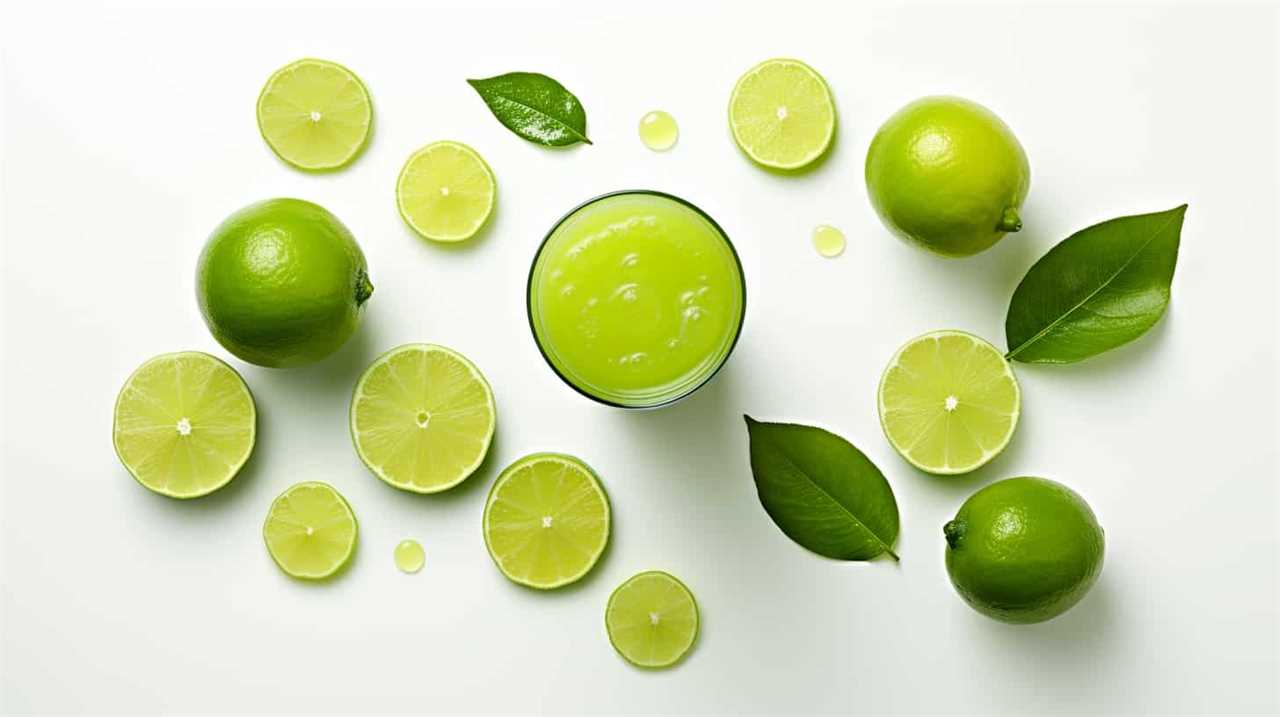
Key Takeaways
- Choose a reputable brand of aloe vera juice that prioritizes quality and uses organic, pure aloe vera.
- Avoid brands that contain added sugars or artificial ingredients.
- Use natural sweeteners like honey, agave syrup, or stevia to enhance the taste of aloe vera juice.
- Experiment with adding fruits, herbs, and other juices to create unique flavor combinations and enhance the health benefits of aloe vera juice.
Choosing the Right Aloe Vera Juice
We can enhance our experience with aloe vera juice by selecting the right brand and type for our preferences. When it comes to finding a reputable brand, it’s important to do some research and read reviews from other consumers. Look for brands that prioritize quality and use organic, pure aloe vera without any added sugars or artificial ingredients. Understanding the health benefits of aloe vera juice is also crucial in making the right choice. Aloe vera is known for its soothing properties, aiding digestion, promoting skin health, and boosting the immune system. By choosing a high-quality brand, we can ensure that we’re getting the maximum benefits from our aloe vera juice.
Now that we know how to choose the right brand, let’s move on to the next step of adding natural sweeteners.
Adding Natural Sweeteners
To enhance the flavor of our aloe vera juice, we can add natural sweeteners such as honey or agave syrup. Using alternative sweeteners not only adds sweetness but also brings unique flavors to the juice. Here are some options to consider:
- Stevia: A natural sweetener derived from the Stevia plant, it’s a zero-calorie alternative to sugar.
- Maple Syrup: This natural sweetener adds a rich and earthy flavor to the aloe vera juice.
- Dates: Pureed dates can be used to sweeten the juice while also providing essential nutrients like fiber.
In addition to using alternative sweeteners, we can enhance the flavor of aloe vera juice by adding spices and extracts. Cinnamon, ginger, or vanilla extract can add warmth and depth to the taste. By experimenting with different combinations of these natural sweeteners, spices, and extracts, we can create a flavor profile that suits our preferences.
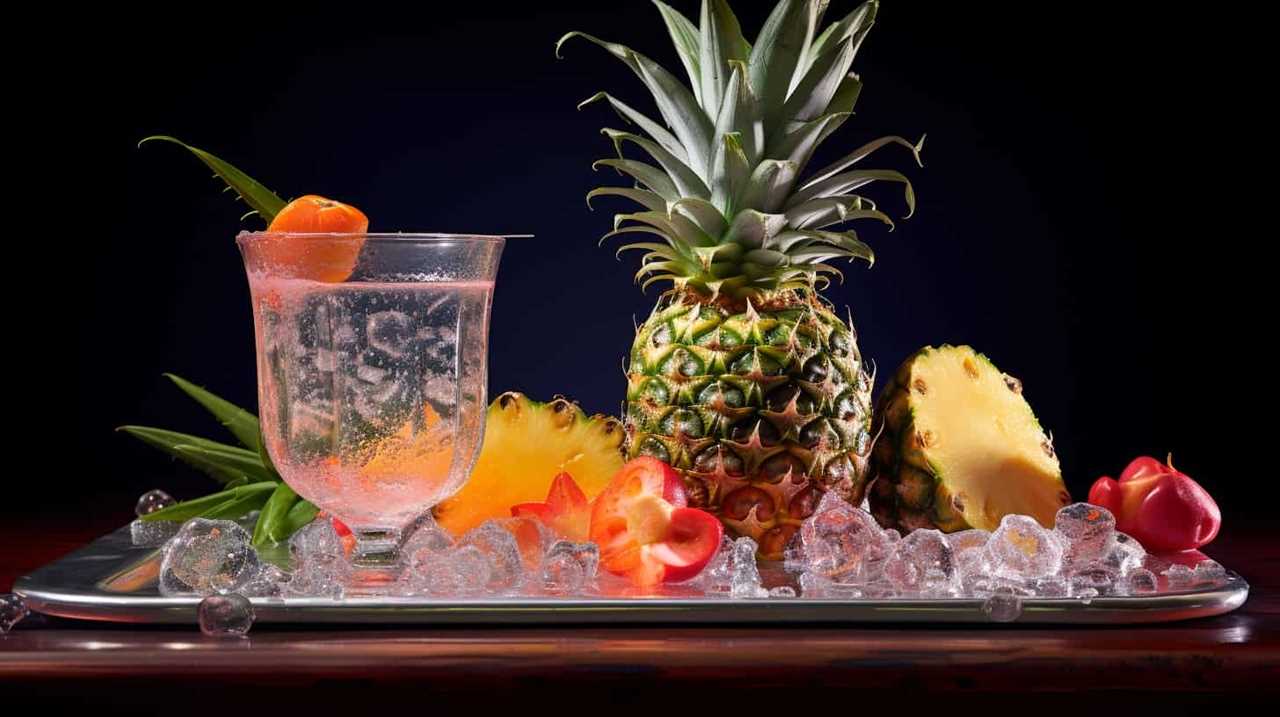
Now, let’s move on to the next section and learn how to infuse aloe vera juice with fruits and herbs to further enhance its taste.
Infusing With Fruits and Herbs
As we explore ways to make our aloe vera juice taste better, one option to consider is infusing it with fruits and herbs. Creating unique aloe vera blends by adding fruits and herbs not only enhances the flavor but also adds a touch of freshness and complexity to the juice.
Fruits like strawberries, pineapple, or citrus can add a burst of sweetness, while herbs like mint, basil, or ginger can provide a subtle yet refreshing twist. Exploring the benefits of herbal infusions can also be beneficial for our health. For example, adding a few sprigs of lavender can promote relaxation and reduce stress. Additionally, infusing aloe vera juice with rosemary can aid digestion and boost the immune system.
Blending With Other Juices
Let’s try mixing aloe vera juice with different fruit juices to create delicious and refreshing blends. Blending aloe vera juice with other fruits not only enhances its taste but also adds nutritional benefits to your drink. Here are three fruit juices that you can mix with aloe vera juice:

- Orange juice: Combining aloe vera juice with orange juice not only adds a tangy flavor but also boosts your intake of vitamin C, which is essential for a strong immune system.
- Pineapple juice: Mixing aloe vera juice with pineapple juice creates a tropical blend that isn’t only refreshing but also helps in digestion. Pineapple contains bromelain, an enzyme that aids in breaking down proteins and promoting better digestion.
- Watermelon juice: Blending aloe vera juice with watermelon juice creates a hydrating and refreshing combination. Watermelon is rich in water content and contains electrolytes that can help replenish your body’s fluids.
Experimenting With Flavor Combinations
While we can try various flavor combinations with aloe vera juice, it’s important to find the right balance to enhance its taste. Experimenting with different flavors can’t only make the juice more enjoyable but also enhance its health benefits.
Aloe vera juice is known for its numerous health benefits, such as boosting digestion, promoting hydration, and supporting the immune system. By adding complementary flavors, we can create a refreshing summer drink that not only tastes great but also provides a nutritional boost.
Some popular flavor combinations include mixing aloe vera juice with citrus fruits like lemon or orange, adding a splash of coconut water for a tropical twist, or combining it with cucumber and mint for a refreshing and cooling effect.
Don’t be afraid to get creative and find the flavor combination that suits your taste buds best!
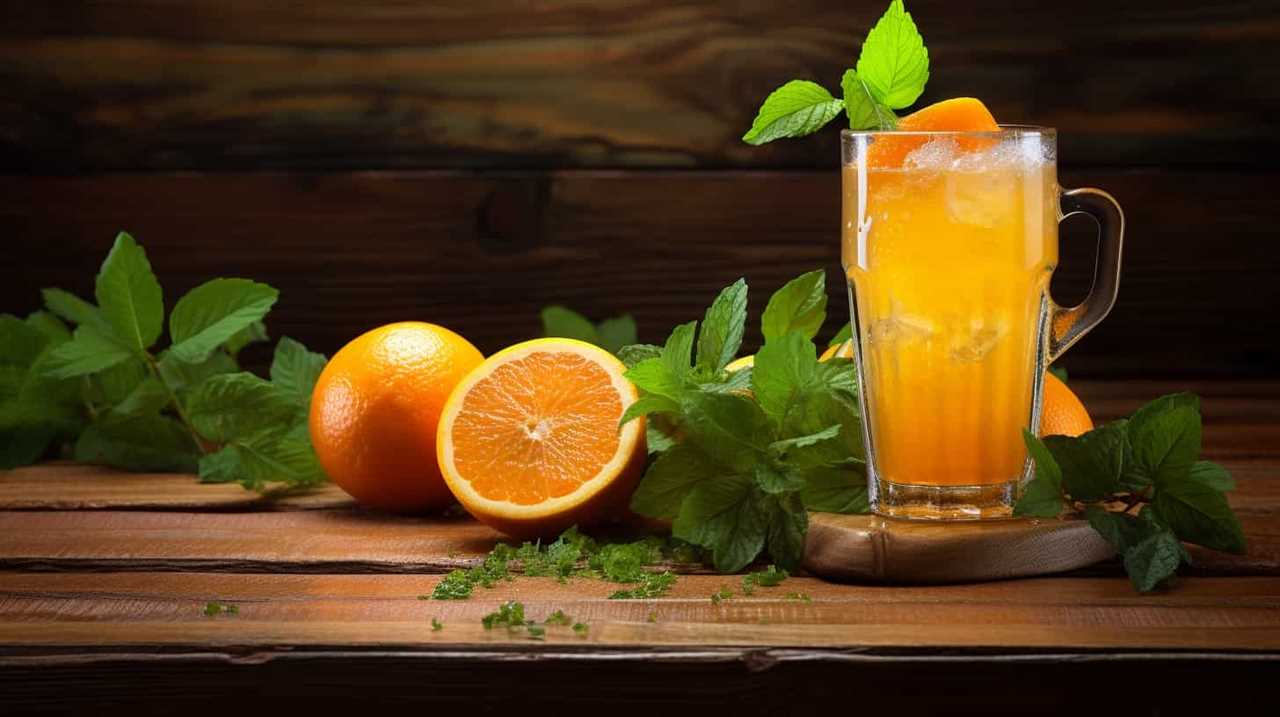
Frequently Asked Questions
Can I Use Store-Bought Aloe Vera Gel Instead of Fresh Aloe Vera for Making Juice?
Yes, you can use store-bought aloe vera gel instead of fresh aloe vera for making juice. However, it’s important to note that fresh aloe vera juice may have more health benefits due to its higher nutrient content.
How Long Can I Store Aloe Vera Juice in the Refrigerator?
Aloe vera juice can be stored in the refrigerator for up to a week. Refrigeration helps maintain the longevity and freshness of the juice, preserving its beneficial properties.
Can Aloe Vera Juice Help With Digestive Issues?
Aloe vera juice can potentially help with digestive issues when taken in appropriate dosages. However, it is important to note that there may be potential side effects. It is always best to consult with a healthcare professional before starting any new supplement regimen.
Can I Use Artificial Sweeteners Instead of Natural Sweeteners in My Aloe Vera Juice?
Using artificial sweeteners in aloe vera juice may affect its taste and potential health benefits. However, natural sweeteners like honey or stevia can enhance the flavor without compromising its nutritional value.

Is It Safe to Drink Aloe Vera Juice Every Day?
Drinking aloe vera juice daily can have numerous benefits, such as improving digestion and boosting the immune system. However, consuming it regularly may also lead to potential side effects like diarrhea or stomach cramps.
Conclusion
In conclusion, making aloe vera juice taste better is easy and enjoyable.
By choosing the right aloe vera juice and adding natural sweeteners, infusing with fruits and herbs, blending with other juices, and experimenting with flavor combinations, you can create a delightful and refreshing drink.
So go ahead and unleash your creativity in the kitchen, and transform your aloe vera juice into a sensational elixir that will transport your taste buds to paradise.
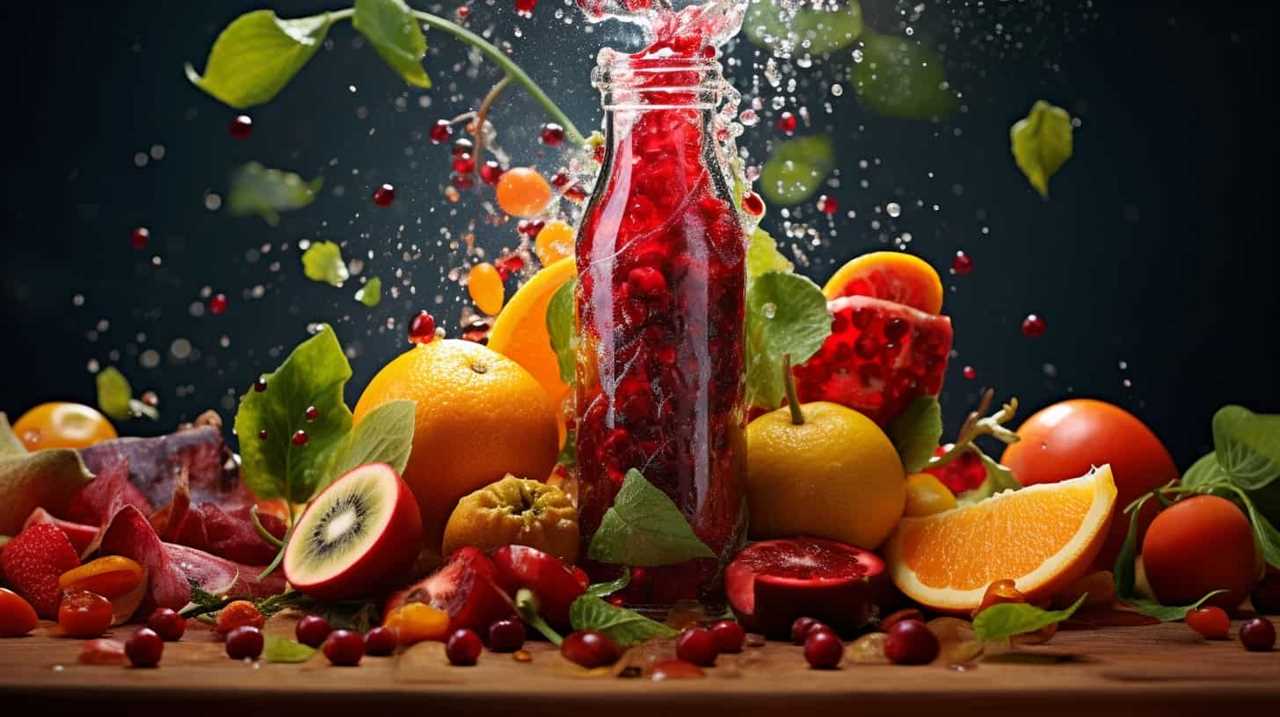
Susannah expertise lies in researching and compiling evidence-based content on juicing, nutrition, and overall health. She is committed to ensuring that The Juicery World offers accurate, up-to-date, and trustworthy information to empower readers to take control of their health. Susannah’s goal is to inspire individuals to embrace juicing as a way to nourish their bodies and live their best lives.
Juice Tips and Tricks
How to Make a Glass of Lemonade With Bottled Lemon Juice

Are you craving a cool glass of lemonade to quench your thirst? Look no further! Try out our perfect recipe using bottled lemon juice that will surely please your taste buds.
In this article, we’ll guide you through the process of creating a tangy and sweet concoction that will leave you feeling refreshed and satisfied.
So grab your ingredients and let’s get started on this delightful journey of serving ourselves and others a glass of pure lemony goodness.
Key Takeaways
- Consider the storage of the bottled lemon juice (dark glass or plastic bottles, protect from light exposure, check expiration date)
- Choose a suitable pitcher and fresh lemons for enhanced flavor
- Store the lemonade concentrate in the refrigerator to maintain freshness
- Adjust the sweetness and tartness to taste with sugar or more lemon juice, and experiment with different sweeteners or additional flavors.
Choosing the Right Bottled Lemon Juice
What are the key factors we should consider when selecting the right bottled lemon juice for our lemonade?

One important factor is how the lemon juice is stored. Look for bottles that are made of dark glass or plastic, as they help protect the juice from light exposure, which can degrade its quality. It’s also important to check the expiration date to ensure freshness.
Another benefit of using bottled lemon juice is convenience. It saves time and effort compared to squeezing fresh lemons. Additionally, bottled lemon juice provides consistent flavor, as the acidity levels are standardized.
When selecting a brand, consider reading reviews and checking for certifications, such as organic or non-GMO.
Gathering the Necessary Ingredients and Tools
How can we gather all the necessary ingredients and tools to make a glass of lemonade with bottled lemon juice?
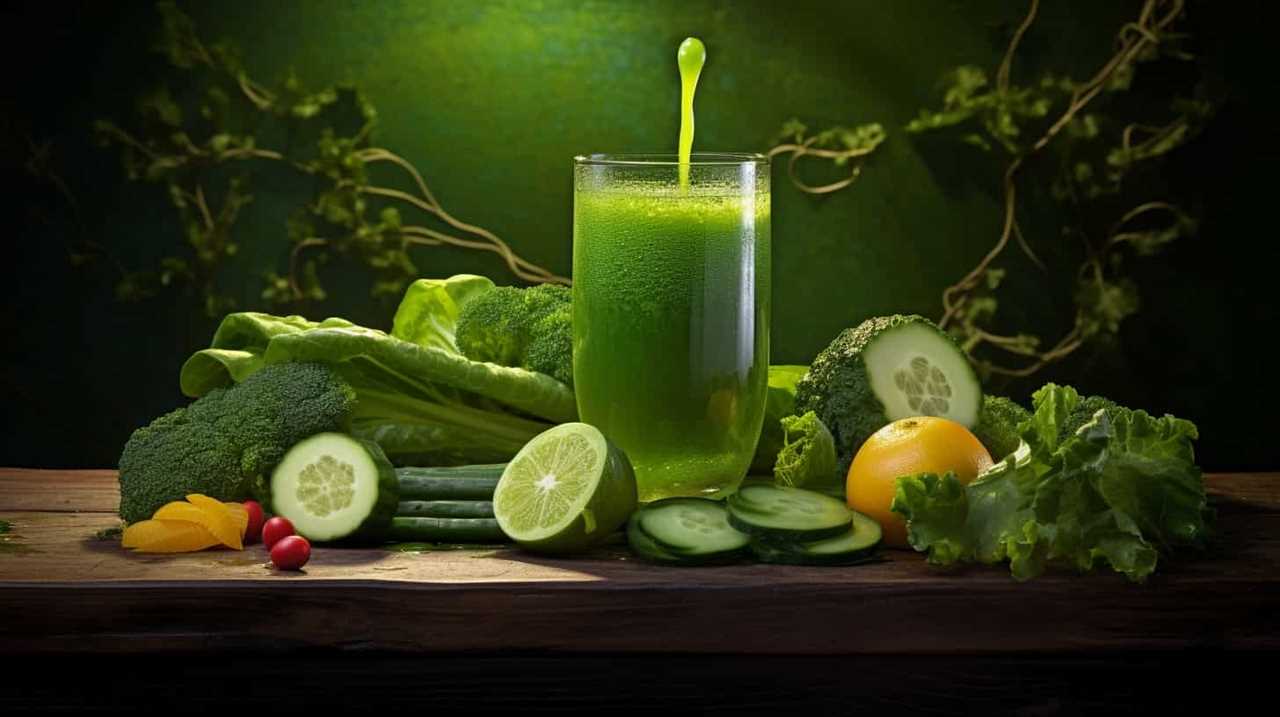
It’s important to start with the right pitcher. Look for a pitcher that’s made of glass or BPA-free plastic, as these materials won’t affect the taste of the lemonade. The pitcher should also have a lid or cover to keep the lemonade fresh and prevent spills.
Now, let’s talk about the lemons. While bottled lemon juice is convenient, using fresh lemons instead can elevate the flavor of your lemonade. Choose lemons that are firm and have a bright yellow color. Give them a gentle squeeze to ensure they’re juicy. To extract the juice, you’ll need a citrus juicer or a reamer. These tools make it easy to get every last drop of juice from the lemons.
Mixing the Lemonade Concentrate
To start mixing the lemonade concentrate, we’ll slowly pour the bottled lemon juice into the pitcher. It’s important to choose the right container for the lemonade concentrate. A pitcher with a lid or a tightly sealed container will help maintain the freshness and prevent any spills or leaks. Once the lemon juice is in the pitcher, we can move on to the next step of adding water and sweetener.
To ensure the lemonade concentrate stays fresh, it’s essential to store it properly. Keep the pitcher in the refrigerator to maintain its cool temperature and prevent any bacteria growth. If you have any leftover concentrate, transfer it to a smaller container with an airtight lid before refrigerating. This will help retain its flavor and prevent any contamination.
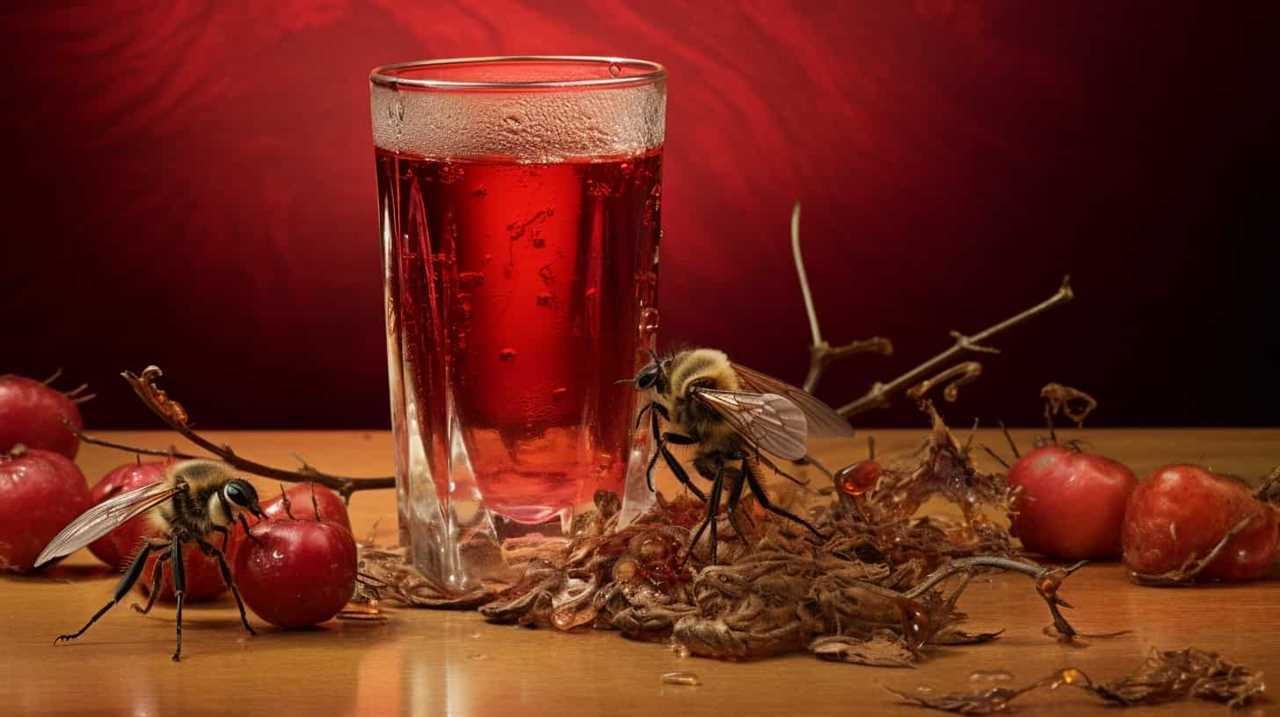
Now that we’ve mixed the lemonade concentrate, it’s time to adjust the sweetness and tartness to taste.
Adjusting the Sweetness and Tartness to Taste
We can adjust the sweetness and tartness of the lemonade to taste by adding more sugar or lemon juice, respectively. If you prefer a sweeter lemonade, simply add more sugar and stir until it dissolves completely. You can experiment with different sweeteners such as honey or agave syrup to find the perfect balance of sweetness.
On the other hand, if you want a tangier lemonade, add more lemon juice gradually, tasting as you go until it reaches your desired level of tartness.
Additionally, you can get creative with your lemonade by adding flavors like fresh mint leaves or a hint of lavender. These additions can elevate the flavor profile and create a more refreshing and unique experience.
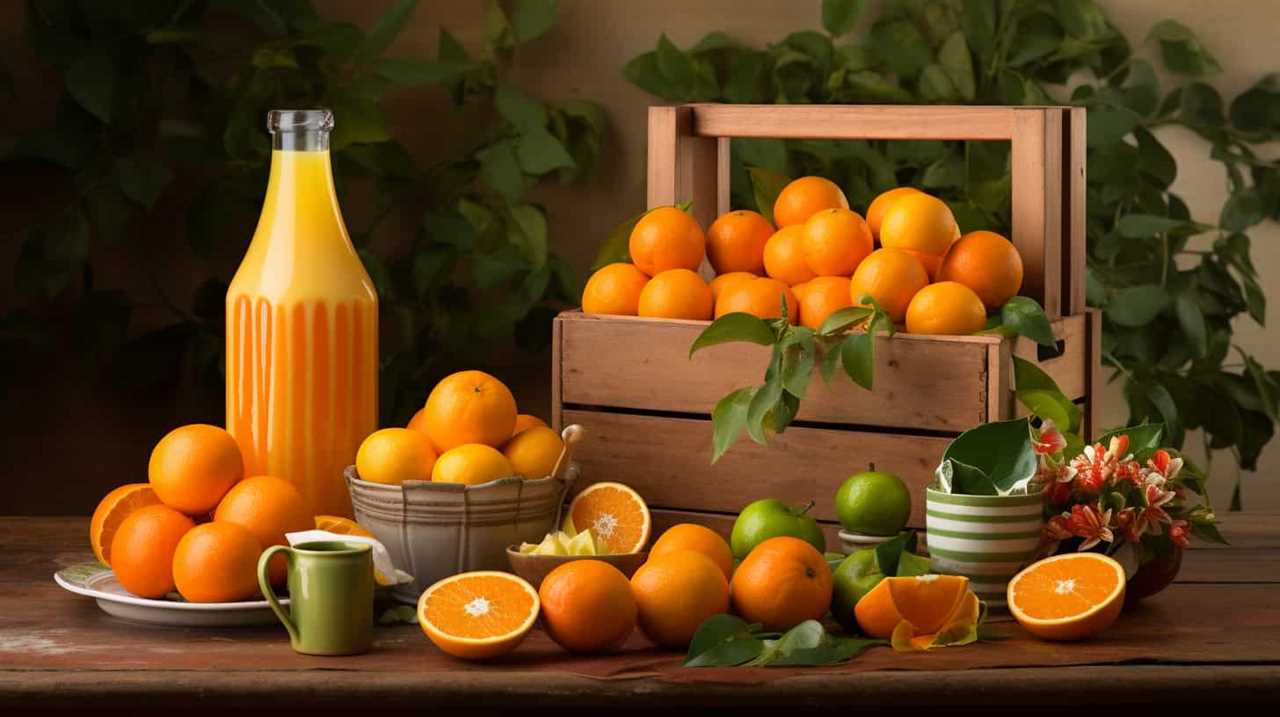
Now that we’ve adjusted the sweetness and tartness of our lemonade, let’s move on to serving and enjoying your refreshing glass of lemonade.
Serving and Enjoying Your Refreshing Glass of Lemonade
Now let’s sit back, relax, and savor our refreshing glass of lemonade.
When it comes to serving and enjoying this delightful drink, there are a few techniques and garnishing options to consider.
Firstly, serving your lemonade chilled is essential for maximum enjoyment. Ensure that you have chilled glasses or add ice cubes to the glasses before pouring the lemonade.

To add a touch of elegance, you can garnish your lemonade with a slice of lemon on the rim of the glass. For an extra burst of flavor, you could also add a sprig of fresh mint or a few berries.
Remember to gently stir the lemonade before serving to evenly distribute the flavors.
Now, take a sip, feel the refreshing tang of lemon, and let the sweet and tart flavors dance on your taste buds.
Cheers!
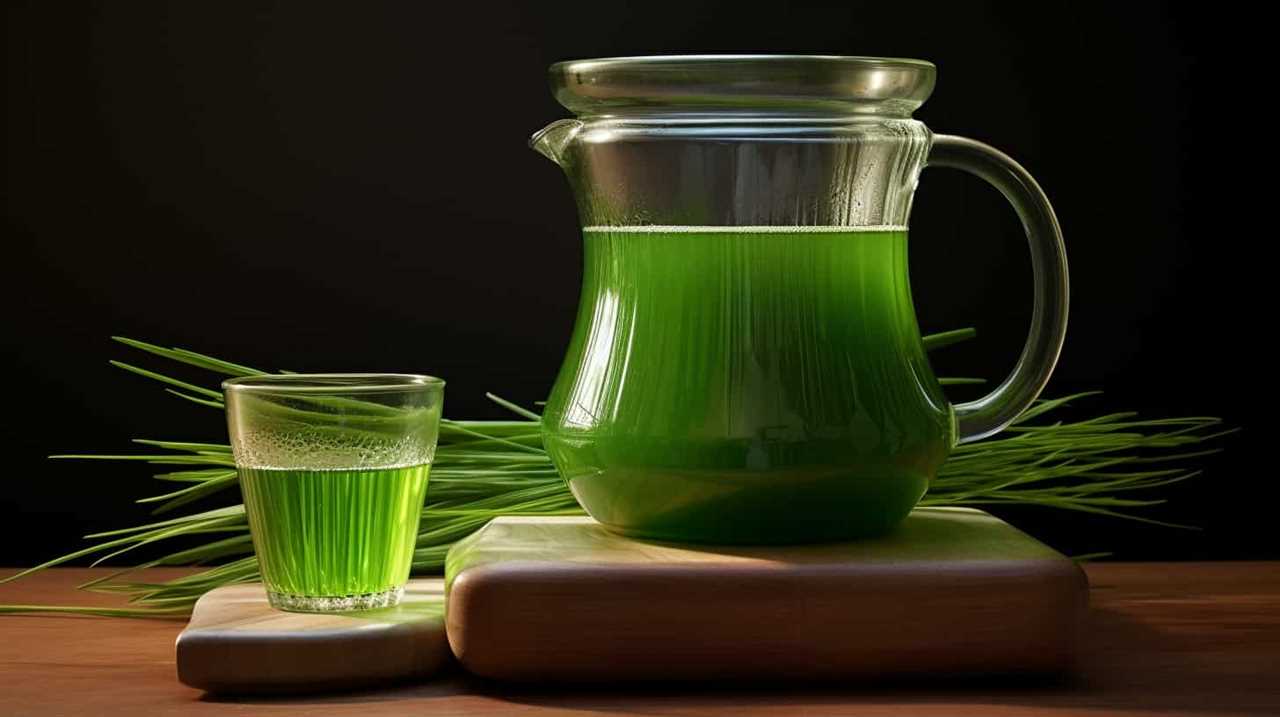
Frequently Asked Questions
Can I Use Fresh Lemons Instead of Bottled Lemon Juice?
Fresh lemons offer numerous benefits over bottled lemon juice. The taste of fresh lemons is unparalleled, providing a vibrant and tangy flavor. Incorporating fresh lemons into your lemonade will elevate its taste and give it a refreshing and authentic twist.
Can I Substitute Sugar With a Different Sweetener?
Substituting sweeteners in lemonade can enhance the flavor and offer health benefits. We’re knowledgeable about alternative sweeteners and can provide precise, detailed instructions on using them in place of sugar.
How Long Does the Lemonade Concentrate Need to Chill in the Refrigerator?
The chilling time for the lemonade concentrate in the refrigerator is typically around 1-2 hours. Using bottled lemon juice offers the benefit of convenience and consistent flavor for a refreshing glass of lemonade.
Can I Add Other Fruits or Flavors to the Lemonade?
Sure, we can definitely add different fruits or flavors to our lemonade. It’s a great way to experiment with unique flavors and create refreshing, personalized drinks. The possibilities are endless!

How Long Does the Lemonade Stay Fresh in the Refrigerator?
Lemonade made with bottled lemon juice can stay fresh in the refrigerator for about 5-7 days. To maximize shelf life, store it in an airtight container and keep it chilled.
Conclusion
And so, with a few simple steps and the right ingredients, a glass of refreshing lemonade is born.
Like a symphony of flavors dancing on your taste buds, this tangy elixir quenches thirst and brings joy on a hot summer day.
Just a sip transports you to a world of citrusy delight, where the sweetness and tartness blend harmoniously.

So go ahead, indulge in the art of lemonade-making and savor every drop of this sun-kissed nectar.
Cheers to the perfect glass of lemonade!
Susannah expertise lies in researching and compiling evidence-based content on juicing, nutrition, and overall health. She is committed to ensuring that The Juicery World offers accurate, up-to-date, and trustworthy information to empower readers to take control of their health. Susannah’s goal is to inspire individuals to embrace juicing as a way to nourish their bodies and live their best lives.
Juice Tips and Tricks
How to Know if Orange Juice Is Bad

We’ve all been in that situation before – reaching for a glass of orange juice and hesitating, unsure if it’s still okay to drink. Fear not! This article will give you the knowledge you need to determine for sure if your orange juice is still fresh or if it’s gone bad.
With a blend of scientific precision and practical tips, we’ll explore color changes, strange smells, off taste, texture changes, and mold or growth that may indicate spoilage.
Let’s dive in and serve ourselves a refreshing glass of certainty!
Key Takeaways
- Color changes in orange juice can indicate a loss of freshness and shelf life extension, but it doesn’t necessarily mean the juice is bad.
- Unusual or off-putting odors in orange juice, such as sour or fermented scents, can be a sign of poor quality.
- An off taste in orange juice, such as sour, bitter, or fermented flavors, suggests that the juice is spoiled.
- Texture changes in orange juice, such as pulp separation or a thicker consistency, can occur as the juice ages, so it’s important to consume it before the expiration date.
Color Changes in Orange Juice
We should be aware that color changes can indicate whether orange juice is bad.

When it comes to orange juice, color is a crucial factor to consider. As oranges are exposed to air, an oxidation process occurs, which leads to changes in color. Fresh orange juice has a vibrant orange hue, indicating its freshness and high nutritional value.
However, as time passes, the juice may undergo a color change, turning dull or brownish. This change in color is a result of the oxidation process, which affects the flavor and quality of the juice. It’s important to note that while a change in color doesn’t necessarily mean the juice is bad, it does indicate that the juice is losing its freshness and shelf life extension.
Therefore, it’s advisable to consume orange juice when it’s at its freshest, as indicated by its vibrant orange color.
Strange Smells in Orange Juice
When it comes to evaluating orange juice, we should be cautious of any strange smells or odors. A fresh, pleasant smell is indicative of good quality orange juice. However, if you notice any unusual or off-putting odors, it may be a sign that the juice has gone bad. These smells can range from a sour or fermented scent to a rancid or moldy aroma.

It’s important to note that while some natural variations in scent can occur due to the specific variety of oranges used, any strong or unpleasant smells should raise concerns. If you have citrus fruit allergies, it’s especially important to pay attention to the smell of orange juice, as it could indicate the presence of spoilage or contamination.
Ensuring the quality of orange juice is essential as it’s a popular beverage known for its health benefits, including being rich in vitamin C and antioxidants.
Off Taste of Orange Juice
Our taste buds can detect even the slightest hint of an off taste in orange juice, which can indicate that it has gone bad. The taste of orange juice should be fresh, tangy, and slightly sweet. If it tastes sour, bitter, or fermented, it’s likely spoiled.
One common cause of an off taste in orange juice is the use of overripe oranges. When oranges become overripe, their flavor profile changes, resulting in a less pleasant taste. Another factor to consider is the expiration date. Orange juice that has passed its expiration date is more likely to develop an off taste. It’s important to check the expiration date before consuming orange juice to ensure its freshness and quality.
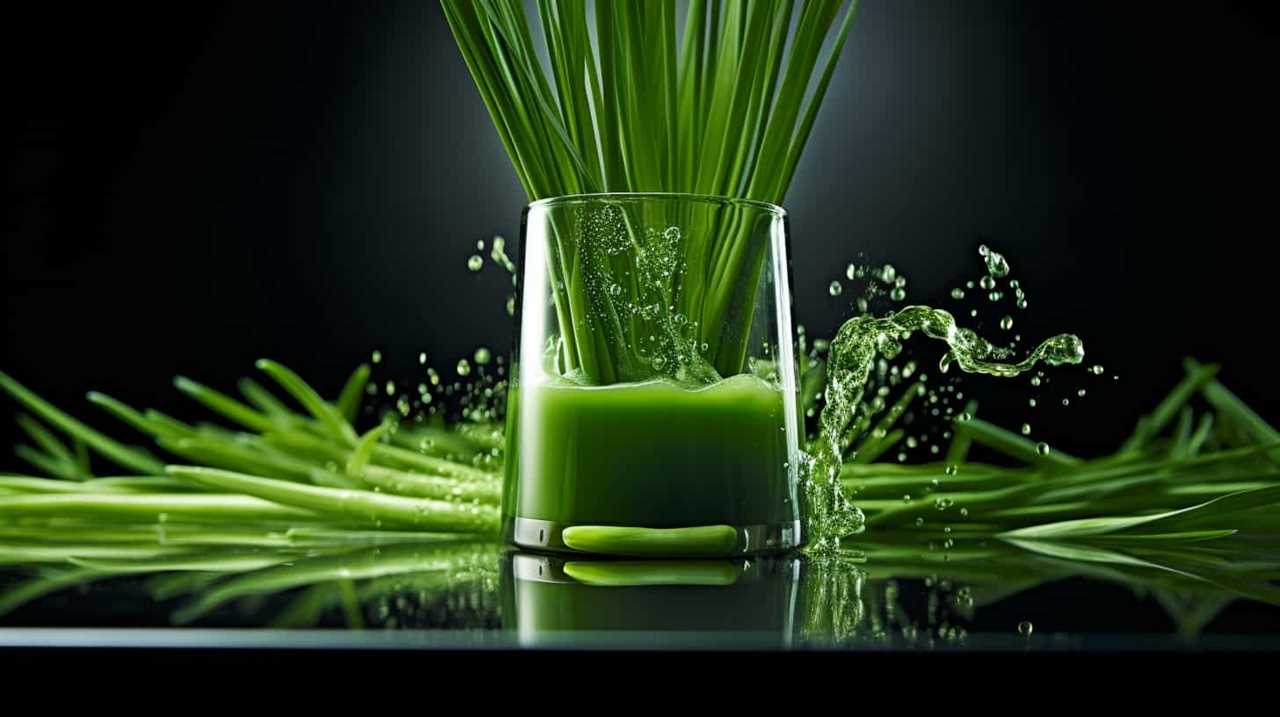
Now, let’s move on to discuss the texture changes in orange juice.
Texture Changes in Orange Juice
As we explore the texture changes in orange juice, it’s important to note that certain factors can cause it to become thicker or develop sediment. One common texture change in orange juice is pulp separation, where the pulp separates from the liquid and settles at the bottom. This can occur naturally over time, as the pulp particles become denser and sink.
Another factor that can affect the texture of orange juice is the expiration date. As orange juice ages, it may start to develop a thicker consistency and even form sediment. This is a result of the natural breakdown of the juice’s components. Therefore, it’s crucial to check the expiration date on orange juice and consume it before it reaches its expiration date to avoid any undesirable texture changes.
Mold or Growth in Orange Juice
We need to be aware of the possibility of mold or other growth occurring in orange juice. Mold can develop in orange juice if it isn’t stored properly or if it has passed its expiration date.
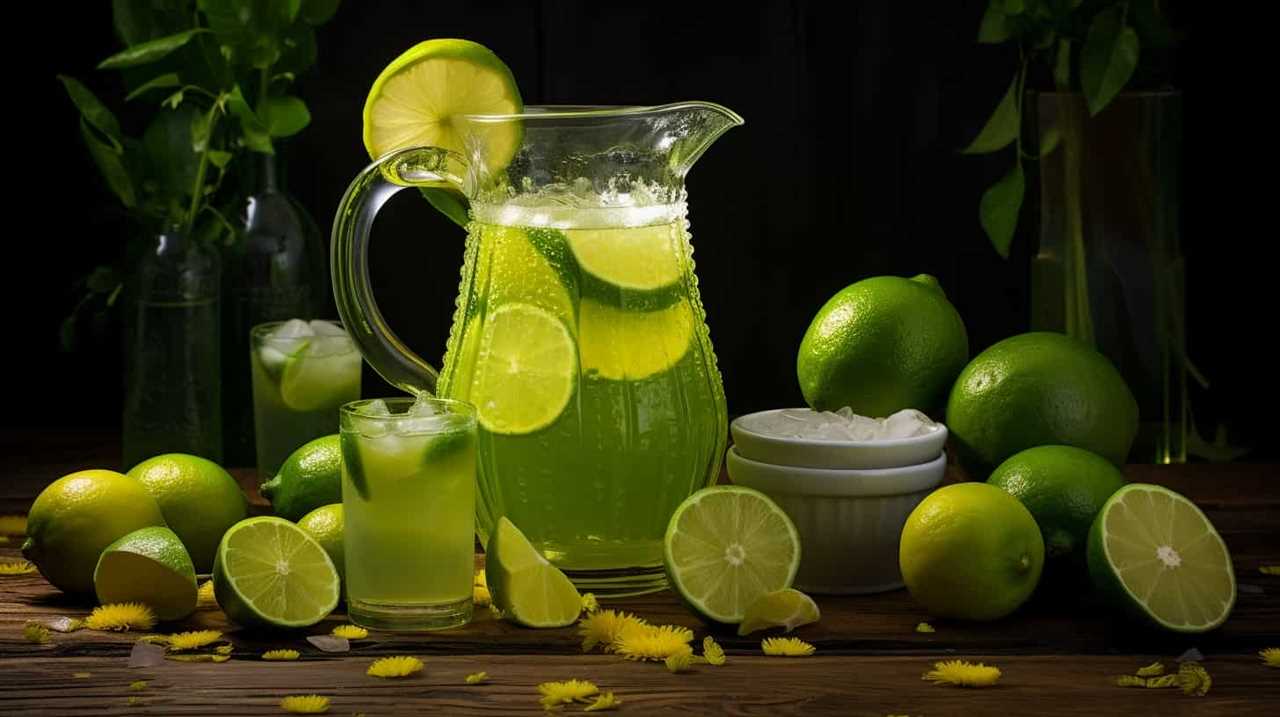
To prevent mold growth, it’s important to follow these steps:
- Store orange juice in the refrigerator at a temperature below 40°F (4°C).
- Check the expiration date on the bottle before consuming. Discard any orange juice that has expired.
- Keep the container tightly sealed to prevent air and moisture from entering, as these can promote mold growth.
Regularly inspecting orange juice for any signs of mold or unusual growth is essential. If you notice any discoloration, a strange odor, or visible mold, it’s best to discard the juice to avoid any potential health risks.
Frequently Asked Questions
Can Orange Juice Go Bad if It’s Stored in the Freezer for Too Long?
Frozen orange juice can potentially lose its nutrients and change its taste if stored in the freezer for too long. It is important to check for signs of spoilage before consuming it.
How Long Can Orange Juice Stay Fresh in the Refrigerator Once It’s Opened?
Once opened, orange juice can stay fresh in the refrigerator for about 7-10 days. To maintain its freshness, store it properly by keeping it tightly sealed and at a consistently cold temperature.
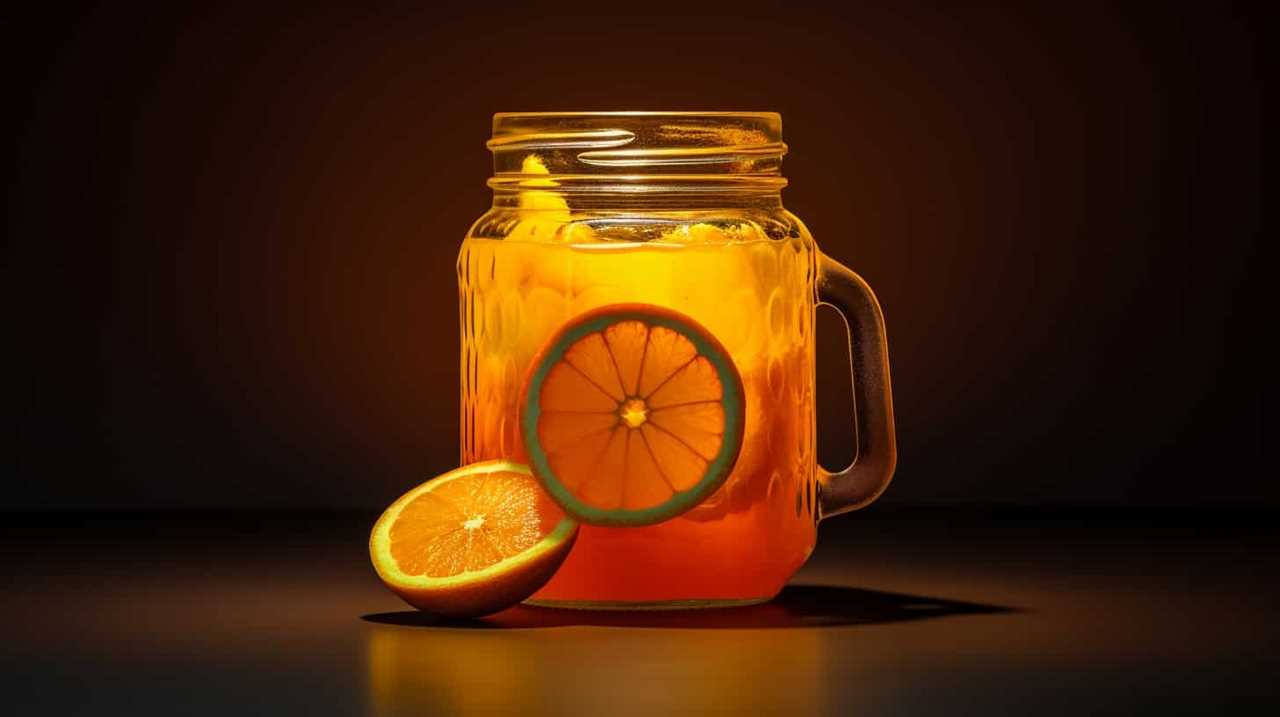
Is It Safe to Consume Orange Juice That Has Been Left Out at Room Temperature Overnight?
Left out orange juice may not be safe to drink as it can harbor harmful bacteria. Signs of spoiled orange juice include a sour smell, mold growth, and a change in color or taste.
Can Orange Juice Develop Harmful Bacteria if It’s Past Its Expiration Date but Still Looks and Smells Fine?
Orange juice can cause food poisoning if it develops harmful bacteria, even if it looks and smells fine. Signs of spoiled orange juice include a sour smell, mold growth, and a change in color or taste.
Does the Nutritional Value of Orange Juice Decrease as It Starts to Go Bad?
As orange juice goes bad, its nutritional value decreases. The longer it sits on the shelf, the more nutrients it loses. Signs of spoilage include a sour smell, off taste, and mold growth.
Conclusion
In conclusion, determining if orange juice is bad requires careful observation of color changes, strange smells, off taste, and texture changes. Just like a detective investigating a case, we must rely on our senses to detect any signs of spoilage.
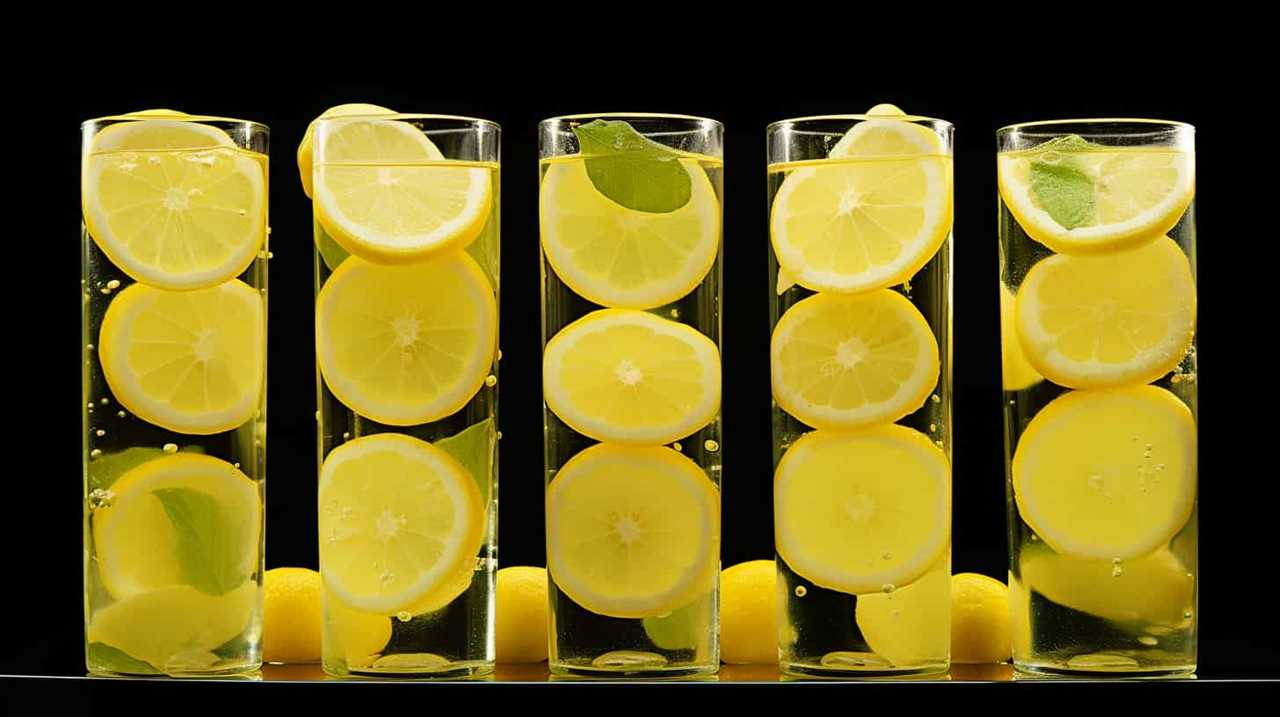
If we detect mold or growth in the orange juice, it’s a clear indication that it’s no longer safe to consume. By remaining vigilant and attuned to these indicators, we can ensure that our orange juice is always fresh and enjoyable.
Susannah expertise lies in researching and compiling evidence-based content on juicing, nutrition, and overall health. She is committed to ensuring that The Juicery World offers accurate, up-to-date, and trustworthy information to empower readers to take control of their health. Susannah’s goal is to inspire individuals to embrace juicing as a way to nourish their bodies and live their best lives.
-

 Fruit Juice Varieties3 months ago
Fruit Juice Varieties3 months agoTop 11 Most Loved Fruit Juice Varieties
-

 Organic and Natural Juices3 months ago
Organic and Natural Juices3 months ago8 Best Organic Brands for Fruit Juice
-

 Juice Manufacturing Process3 months ago
Juice Manufacturing Process3 months ago9 Best Steps in Industrial Juice Manufacturing Process
-

 Juice Tips and Tricks3 months ago
Juice Tips and Tricks3 months agoHow to Make a Glass of Lemonade With Bottled Lemon Juice
-

 Juice Tips and Tricks3 months ago
Juice Tips and Tricks3 months agoHow to Make Aloe Vera Juice Taste Better
-

 Vegetable Juices3 months ago
Vegetable Juices3 months ago5 Best Low-Sugar Vegetable Juice Choices
-

 Juice Tips and Tricks3 months ago
Juice Tips and Tricks3 months agoHow to Know if Orange Juice Is Bad
-

 Beginners Guides3 months ago
Beginners Guides3 months agoHow to Know When Orange Juice Is Bad






